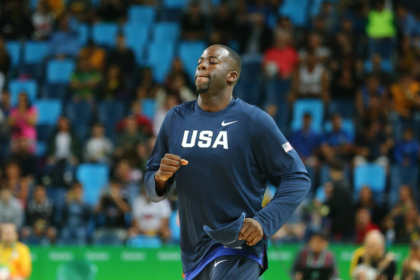 No one is excusing Serena Williams’ boorish behavior at the 2009 U.S. Open, where she threatened to perform painful invasive surgery on a lines judge using a tennis ball. The foot fault call against Williams during the semi-final match, and Williams’ blowtorch response, was the single most memorable sporting event by a female this past year. Yet her landslide win as the AP Female Athlete of the Year was not a referendum on whether sportswriters excused it, agreed with it or even ignored it.
No one is excusing Serena Williams’ boorish behavior at the 2009 U.S. Open, where she threatened to perform painful invasive surgery on a lines judge using a tennis ball. The foot fault call against Williams during the semi-final match, and Williams’ blowtorch response, was the single most memorable sporting event by a female this past year. Yet her landslide win as the AP Female Athlete of the Year was not a referendum on whether sportswriters excused it, agreed with it or even ignored it.
Instead, the younger Williams sister’s win was acknowledgment of arguably the most dominant performance by a female athlete since, well, when Williams won the same award seven years previously. There was not even a female close to second place as Williams captured 66 of the 158 votes. No other candidate received more than 18 votes.
The award says that one ugly event, however regrettable, will not eclipse a player’s return to the pinnacle of her sport.
“People realize that I’m a great player,” Serena says, not bothering to bore us with unnecessary and fake humility. “And one moment doesn’t define a person’s career. And I was right, for the most part. It wasn’t right the way I reacted — I never said it was — but I was right about the call.”
Serena is also right about calling herself a great player. But it’s deeper than that. She also deserves the award for injecting desperately needed cachet, flavor and pizzazz into a sport that can be about as exciting as dried oatmeal.
Serena has sustained a higher level of play through a potent combination of power, athleticism, precision, experience and intelligence, even though most tennis “experts” and reporters will only credit her dominance to the first two characteristics.
“We can attribute the strength and the growth of the women’s tennis a great deal to her,” said Stacey Allaster, the WTA Tour chairman and CEO. “She is a superstar.”
Serena Williams’ older sister, Venus, while remaining a formidable and intimidating opponent for anyone not named Serena, is clearly on the back end of her historic Hall of Fame career. Subsequently, the sport leans more and more on the chiseled yet feminine frame of sister Serena.
Actually, this year-end award should acknowledge Serena and Venus as co-female Athletes of the Decade. They’ve long withstood widespread criticism — even cowardice and mean-spirited shots taken at them by the games legends like Martina Navratilova and Chris Evert — for their varied interests off the court that tore away from their single-minded pursuit of tennis immortality. They were right to follow their father’s advice — and who’d ever think “Richard” and “wise” could be used in the same sentence — to lead balanced lives. As their former archrivals fell away because of burnout, personal problems and family reasons, the Williams sisters continued to hoist their sport afloat with their individual flair, talent and transcendent personas. And they entered the pantheons of tennis greatness.
–terry shropshire










